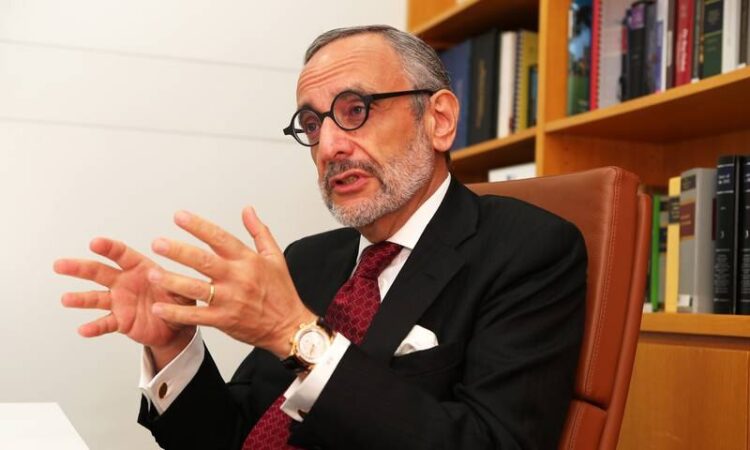How Dubai’s digital economy court aims to combat cryptocurrency fraud and keep AI in check

The head judge of Dubai’s dedicated digital economy court has told of how the emirate aims to keep pace with an evolving legal landscape to help safeguard the public against emerging threats such as cryptocurrency fraud.
Justice Michael Black works at the Dubai Digital Economy Court, launched in December last year to act as a crucial arbiter in disputes arising from advanced technology, from artificial intelligence and big data to blockchain, 3D printing and robotics.
“It’s a new area and we are in no doubt that the wave is coming,” Justice Black told The National.
“We have to look at what was said to be science fiction about seven years ago and is now science fact.”
The senior judge said the court’s current workload primarily involves the use and misuse of digital currency.
He said one high-profile cryptocurrency case at the court was the subject of “huge international interest”.
The cutting-edge body, managed by Dubai Financial Centre Courts, has been heralded by authorities as a world first.
It provides civil and commercial litigation for cases within the rapidly expanding digital economy field.
Landmark cryptocurrency case
The dispute, involving a number of Dubai-based cryptocurrency trading companies, concerns the alleged misappropriation of 300 bitcoins worth about Dh31.2 million ($8.5 million).
Legal action was brought when a claim was made that transferred bitcoins had disappeared from a digital wallet before the purchase price was settled.
The buyer’s representative had insisted on setting up the digital wallet, supposed to be securely overseen by both parties.
Two hours after the bitcoins were transferred, they were moved to another wallet, leading to police involvement and eventually a court case.
Last October, the digital court decided the agreement had not amounted to a binding contract.
The case highlighted issues such as the safe transfer of cryptocurrency and the obligations of a custodian of cryptocurrency.
“It’s quite rare to have a case of this size in the world,” said Justice Black.
“Most cases in England and the US have involved quite small investors who have lost money in crypto exchanges.”
The case is scheduled to go to the Court of Appeal in January, potentially setting legal precedents in an emerging field, he said.
“Our decision in January will be reported widely throughout the world because there is a massive international interest in the decision of any court on this subject.”
Shaping the future
Justice Black is a judge at the DIFC Court of Appeal in addition to being in charge of the digital court.
He has been part of DIFC Courts since its establishment in 2004. He previously served as a deputy judge of London’s technology and construction court between 1999 and 2013 and as a deputy High Court judge from 2008 to 2013.
He was responsible for devising the digital court’s rules and regulations, ensuring they were flexible enough to adapt to the changing requirements of a developing field.
“The rules of the court were made in a way that recognises that we don’t know what’s going to come through the door but that we continue to learn,” he said.
The legal expert said court officials underwent regular training as part of a proactive approach to dispensing justice.
“We keep up to date, study markets and developments, and be as agile and innovative as we have been allowed to be,” he said.
As well as dealing with multimillion-dirham cases, the court also oversees smaller claims.
“With a small-claims jurisdiction, the court offers a user-friendly service for disputes involving as little as $10,000,” he said.
The court aims to broaden its scope to include matters related to AI, smart contracts, Distributed Autonomous Organisations (DAOs) and Autonomous Digital Enterprises (ADEs).
DAOs are blockchain-based entities that exist purely as computer code and have no physical offices.
ADEs are businesses run entirely by computer programmes, indicating a future with minimal human involvement.
“The law really has to come to terms with what that is, and that’s the sort of entity that is going to be running commercial operations in the future,” said Justice Black.
Court key to digital era
Ghassan El Daye, partner and head of litigation in the Middle East for UK-based law firm Charles Russell Speechlys, which is leading the case involving the complex cryptocurrency dispute, said the court will be a vital tool in settling digital disputes for years to come.
“We have found that the court’s specialised expertise in areas like blockchain technologies and digital currencies allows for the unique challenges and complexities of these sectors to be addressed more effectively,” he said.
“The court’s use of technology has streamlined legal processes, reducing both the time and resources required for dispute resolution by individuals who are well-versed in the subject matter.”
He said the court will further encourage the growth of the digital economy in the Emirates.
“By creating a legal environment that is attuned to the digital economy, the court is fostering innovation and encouraging businesses to adopt new technologies,” Mr Ghassan said.
“The court signals to foreign tech companies and start-ups that the UAE’s legal system is fully equipped to navigate the intricacies of the digital sphere.”
“This will undoubtedly make the UAE an even more attractive destination for foreign investors interested in the tech sectors.”
Updated: October 13, 2023, 3:00 AM






